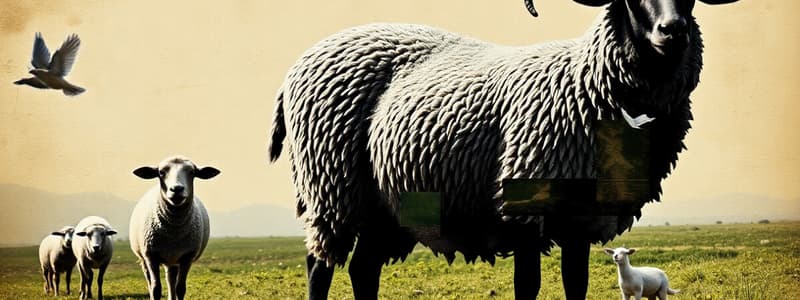Podcast
Questions and Answers
What is the average annual mutton consumption in J&K?
What is the average annual mutton consumption in J&K?
- 500 to 600 lac Kgs (correct)
- 300 to 350 lac Kgs
- 400 to 500 lac Kgs
- 600 to 700 lac Kgs
How many sheep/goat units were established under the Integrated Sheep Development Program in FY 2020-21?
How many sheep/goat units were established under the Integrated Sheep Development Program in FY 2020-21?
- 600 and 300
- 800 and 220
- 1000 and 150
- 882 and 201 (correct)
What was the cost associated with establishing the sheep/goat units under the ISDS?
What was the cost associated with establishing the sheep/goat units under the ISDS?
- ₹ 9 crore
- ₹ 11.25 crore (correct)
- ₹ 15 crore
- ₹ 12 crore
How many elite rams/bucks were purchased and distributed under the CSS-NLM program?
How many elite rams/bucks were purchased and distributed under the CSS-NLM program?
What type of sheep were imported from Australia to develop pure lambs in J&K?
What type of sheep were imported from Australia to develop pure lambs in J&K?
What was the primary aim of the Integrated Sheep Development Program launched in 2020-21?
What was the primary aim of the Integrated Sheep Development Program launched in 2020-21?
How does the Integrated Sheep Development Program ensure sustainability?
How does the Integrated Sheep Development Program ensure sustainability?
What direct impact did the establishment of sheep/goat units have during the current fiscal year?
What direct impact did the establishment of sheep/goat units have during the current fiscal year?
What is a notable outcome from the breeding program involving elite merino sheep imported from Australia?
What is a notable outcome from the breeding program involving elite merino sheep imported from Australia?
What significant investment was made in the establishment of sheep/goat units during the fiscal year?
What significant investment was made in the establishment of sheep/goat units during the fiscal year?
Flashcards are hidden until you start studying
Study Notes
Sheep and Goat Sector in Jammu and Kashmir (J&K)
- J&K has a significant demand for mutton, consuming an average of 500-600 lakh kgs per year.
- Local production is around 300-350 lakh kgs, leaving a gap of 150-300 lakh kgs that is imported from other Indian states.
- This dependence on imports provides a significant opportunity for investment and job creation in the sheep and goat sector.
Integrated Sheep Development Scheme (ISDS) 2020-21
- The J&K government launched the ISDS in 2020-21 to increase mutton production and promote entrepreneurship.
- The scheme provides sheep and goat units to beneficiaries free of cost.
- The livestock is retrieved in phases over five years and used to establish new units.
- During FY 2020-21, 882 units (10 sheep each) and 201 units (25 sheep each) were established at a cost of ₹11.25 crore.
- These units directly employed 1083 people.
Other Initiatives
- In addition to the ISDS, 290 sheep and goat units were established through other Central and UT schemes, creating employment for 290 people.
- Over 300 pure merino lambs were born from Australian merino sheep imported to J&K.
- Another 300 lambs were born by crossing Australian sheep with Kashmir Merino breeds.
- The department purchased and distributed 2300 elite rams/bucks under the National Livestock Mission (NLM) for genetic improvement of private livestock.
- Approximately 1000 rams/bucks were also produced on government farms and distributed to farmers for genetic improvement.
Sheep/Goat Sector in Jammu & Kashmir (J&K)
- J&K consumes 500-600 lakh kgs of mutton annually, but only produces 300-350 lakh kgs, leading to a dependence on imports.
- The UT imports 150-300 lakh kgs of mutton each year, presenting investment opportunities and employment potential.
Integrated Sheep Development Scheme (ISDS) 2020-21
- The J&K Government launched the ISDS to boost mutton production and entrepreneurship.
- The scheme offers free livestock to beneficiaries, which are retrieved over 5 years for establishing new units.
- During FY 2020-21, 882 units (10 sheep each) and 201 units (25 sheep each) were established, costing ₹ 11.25 crore.
- The scheme created direct employment for 1083 people.
Other Sheep/Goat Development Initiatives
- An additional 290 units were established under other Central Sector Schemes (CSS) and UT sector schemes, employing 290 individuals.
- Over 300 pure merino lambs were born from elite merino sheep imported from Australia.
- 300 more lambs were bred by crossing Australian sheep with Kashmir Merino sheep.
Genetic Upgradation of Livestock
- The department distributed 2300 elite rams/bucks under CSS-NLM to improve livestock in the private sector.
- Around 1000 rams/bucks were bred and distributed by government farms to further enhance the genetic quality of local livestock.
Studying That Suits You
Use AI to generate personalized quizzes and flashcards to suit your learning preferences.




